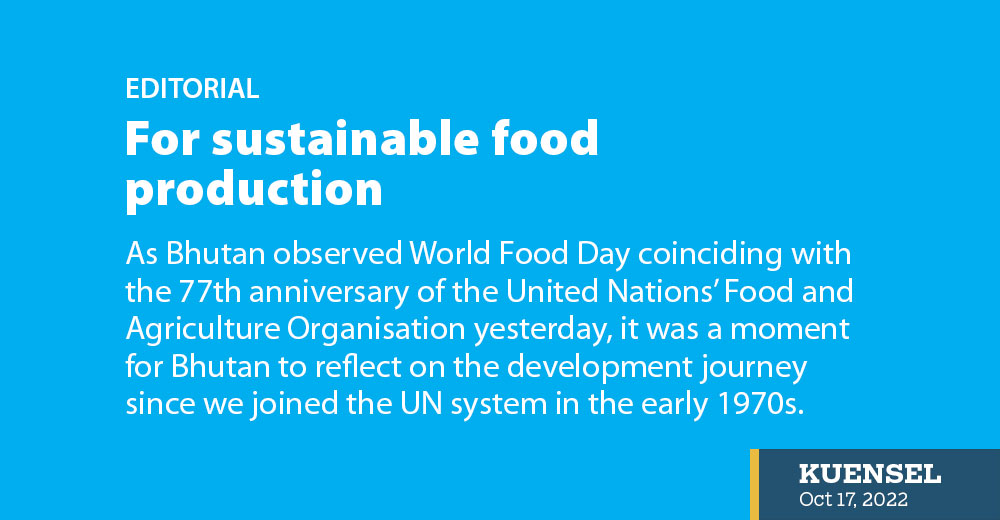As Bhutan observed World Food Day coinciding with the 77th anniversary of the United Nations’ Food and Agriculture Organisation yesterday, it was a moment for Bhutan to reflect on the development journey since we joined the UN system in the early 1970s. More to the point, it was a day most opportune to zoom in on the state of our agriculture and food production.
In particular, this year’s theme for the celebration—“Better production, better nutrition, better environment and a better life”—could not have been more apt for Bhutan.
Hunger and starvation are a serious problem for many countries. Sustainable farming, therefore, needs to be brought into focus. Achieving food and nutrition security is the top priority for Bhutan. For that, the country needs to increase overall production in the sector. Thanks to Covid-19, we were able to boost domestic production of food through initiatives such as mechanisation, land consolidation, and urban farming.
Already Bhutan’s effort to transform agriculture or agrifood systems is gaining wider attention. The country’s focus on organic agriculture is being lauded and talked about in big and important fora. But then, we also are acutely aware that there are many gaps that need filling.
Agriculture will continue to be the biggest employer for many Bhutanese—more than half of the Bhutanese population is involved in the sector. However, besides limited arable land and difficult terrain, building a resilient and productive agricultural system continues to remain a challenge. There are also emerging challenges such as soil fertility loss and the impacts of climate change that need our urgent attention.
Food and Agriculture Organization observed that rising food prices, floods, drought, and increasing climate-related disasters, among others, are affecting the region’s most vulnerable people. “The region’s complex agrifood systems are under enormous strain.”
The biggest threat in the sector will be to smallholders. Therefore, Bhutan can ill afford to not fast-track the transformation of the country’s agrifood systems which simply put is focusing on better production and nutrition.
Bhutan has launched a programme to promote an inclusive, sustainable and resilient agricultural production which will involve revolutionising the foundations of the agriculture sector such as developing comprehensive plans for soil fertility, land use, and land lease, securing investments and technology to stem wildlife conflict, and securing inputs such as seeds, fertilisers and machinery, among others.
In the face of increasing population and import figures, not forgetting the inherent challenges such as empty rural households and rising unemployment among the country’s young people, it is time we gave a leg up to the sector which has the potential to address a lot of our current and future challenges.


